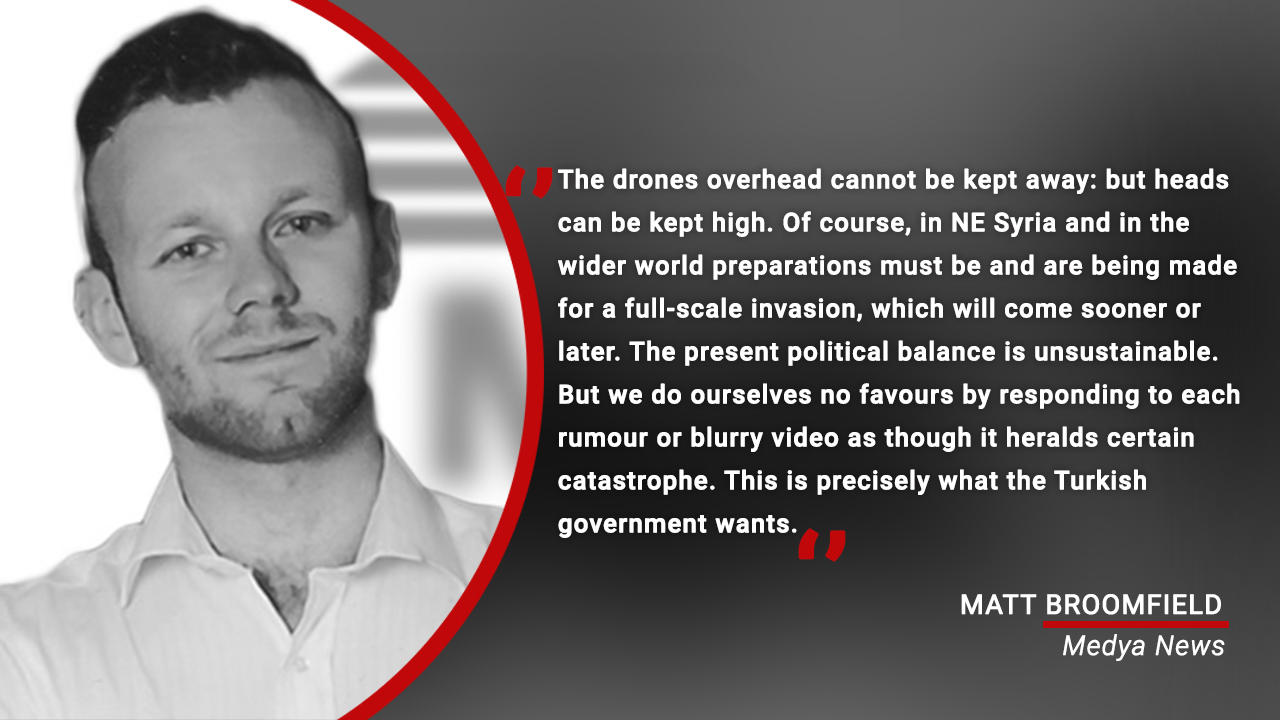Matt Broomfield
Each time Turkey threatens a fresh invasion of the Kurdish-led autonomous regions in North and East Syria, it spreads a wave of panic through the Kurds’ friends and supporters in the West. The response is understandable. We all know what another invasion would mean. But during the years I spent in Rojava (Syrian Kurdistan), I came to understand how people living under actual threat of drone strikes and ethnic cleansing learn to keep a cool head in a crisis, resist Turkey’s efforts to spread fear and dismay, and keep on quietly building their revolution.
It is a lesson we could all benefit from.
Most recently, routine Turkish troop movements and messages broadcast by mosques on the border with Syria provoked a flurry of messages on social media, asserting for perhaps the twentieth time this year that a ground invasion was coming soon, that very night, naming precise locations and objectives for an operation that never emerged. Ironically, it was the Turkish Interior Minister himself who spoke out to confirm what NE Syria’s top military commander Mazloum Abdi said earlier this month – that for now, neither the USA nor Russia are willing to condone such an assault.
Such panic is not confined to social media. When I was working with the Rojava Information Centre (RIC), this was one of the most common requests we received from both foreign journalists and friends and acquaintances in Syria itself – “people here say Turkey is about to invade. Is it true? Do you know anything about it?”
Panic can and does spread among locals, as rumours spread on social media or are disseminated by agents provocateurs. As regards other foreign volunteers in NE Syria, the distress was particularly acute among those who had left and returned to their home countries in the West. I myself am by no means immune, remaining relatively sanguine until I set foot back in the UK, whereupon every round of shelling suddenly seemed like the prelude to another invasion.
One shell is too many. Each drone strike is an atrocity. With 75 civilians dead and wounded in the space of a month at Turkey’s hands, including scores of children, we are right to condemn Turkey’s actions as a war of attrition intended at depopulating the region of its inhabitants. Turkey’s intent is precisely to make people feel as though they are living in a permanent condition of war – as Turkish Defence Minister Hulusi Akar put it, “the operation is already happening.”
But those who actually suffer these conditions find ways to survive, and resist the psychological aspect of Turkey’s war. I will always remember the response of one seasoned political activist in Qamishlo in the run-up to Turkey’s 2019 invasion, when I asked her if she believed the operation really was imminent – “everything’s fine,” she answered off-handedly, “Go on with your work as normal and don’t worry… Just make sure you know where the nearest bomb shelter is.”
At the time, we laughed. But her answer encapsulates the attitude many locals take to Turkey’s threats. The war is a reality, a bitter one, one which has killed their friends and family. But it cannot be escaped, and so they must keep on working at their allotted tasks, building and rebuilding their communities.
When I first arrived in Rojava, in the aftermath of Turkey’s 2018 invasion and occupation of the Afrin region, I had expected to find all of NE Syria in disaray and panic, the revolution halted as people fled or scrambled to defend themselves. Of course, that operation was a huge blow, turning the most successful and progressive zone of the revolution into a miserable pit of feuding jihadi factions and common criminals. But far from giving up, those affected were immediately starting to rebuild the same communes, councils, and co-operatives in the refugee camps, their pain apparent, their enthusiasm infectious. When I visited these camps in Shehba, I learned the meaning of dignity, endurance, a refusal to submit to panic.
Much the same happened during the 2019 invasion, when Western journalists wrote opinion-pieces gloomily prognosticating ‘the end of Rojava’, shedding tears as they fled into Iraq. Three years on, rumours of the death of the revolution have been greatly exaggerated. In the Tel Samen refugee camp, I met people displaced three times in the course of the Syrian conflict who continue to work for the same goals of peace, democracy and mutual understanding they did when they still had their homes.
This level-headed attitude might sometimes emerge as gallows humour. It might also manifest as thousands of people turning out to protest camps on the border, marches or funerals, knowing another drone could strike any moment. The drones overhead cannot be kept away: but heads can be kept high. Of course, in NE Syria and in the wider world preparations must be and are being made for a full-scale invasion, which will come sooner or later. The present political balance is unsustainable. But we do ourselves no favours by responding to each rumour or blurry video as though it heralds certain catastrophe. This is precisely what the Turkish government wants.
That same political activist who laughed at we lily-livered Westerners had lost, she said, 38 of 40 members of her original training group to Turkish bombs and bullets. These are people who know full well the cruelty Turkey inflicts on their people. They know we must do what we can to defend ourselves, working ceaselessly and tirelessly, for – as a Kurdish saying has it – ‘fire and water stop, the enemy does not.’ But they also know this: we must not allow Turkey to occupy our every waking minute, our imagination, our dreams.










